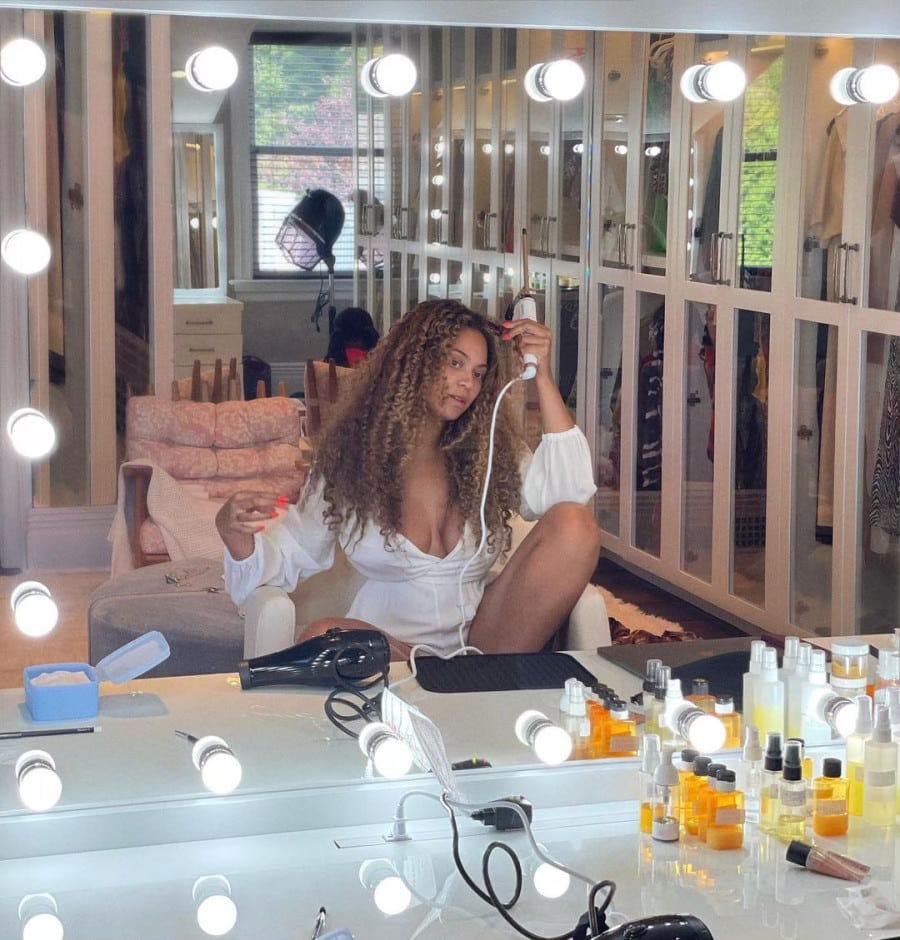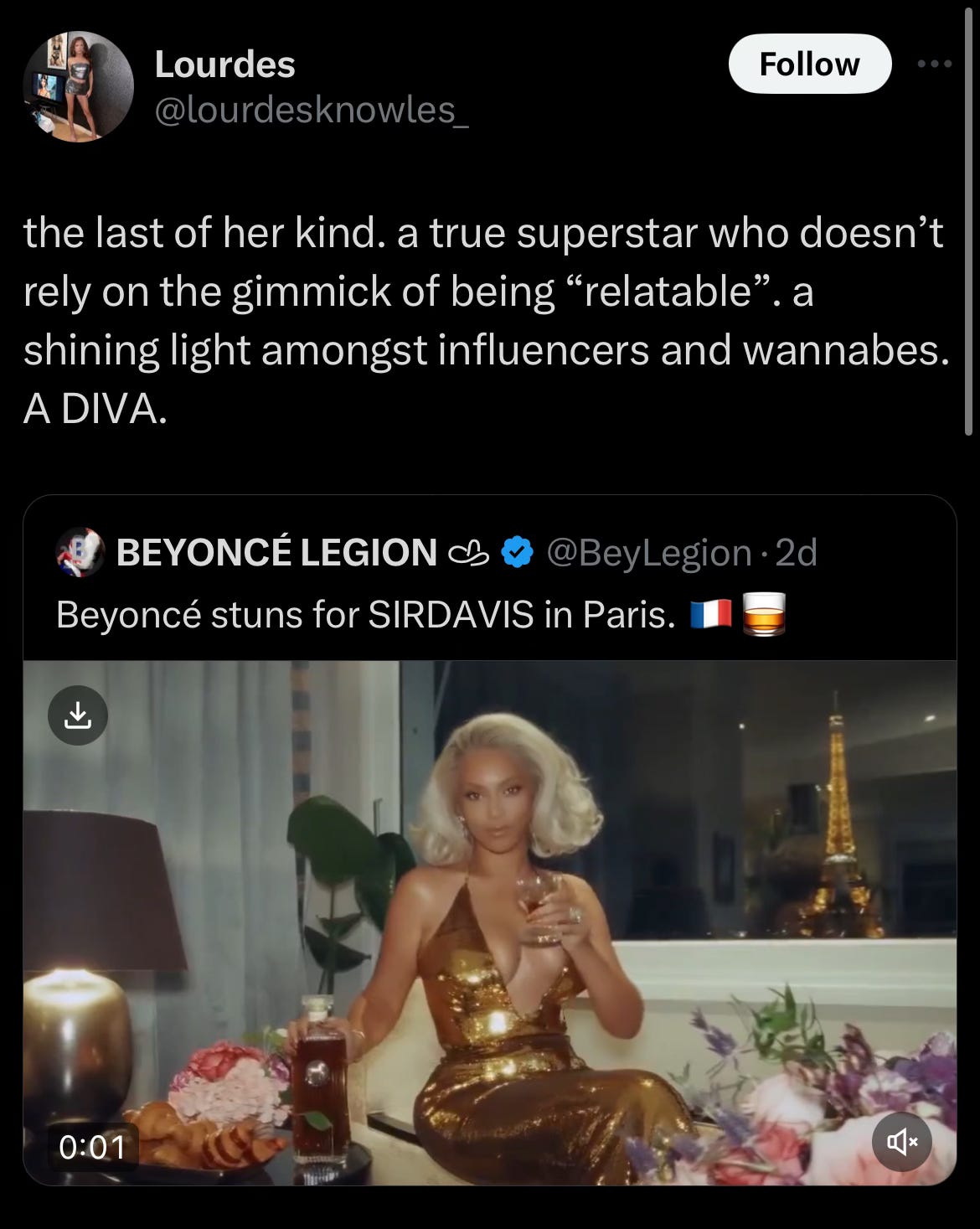everybody wants to be Beyoncé, nobody wants to be Beyoncé
on the business (or lack thereof) of a cultural icon
believe me when I say I woke up ready to do my usual news roundup. Beyoncé was supposed to be just a paragraph, but one paragraph turned into two, and that turned into this. nothing interesting happened anyway. enjoy!
I have this friend, who is actually my best friend, who’s a massive Beyoncé fan. She loves Beyoncé the way white girls love Taylor Swift—shamelessly and beyond reason, wallets wide open. Devotion like hers is the reason I could never in good faith claim to be a member of the Beyhive. Sure, I like Beyoncé’s music. Sometimes I love it. I’m in awe of her talent and occasionally warmed by what I assume she stands for. I got mad when she was snubbed by the CMA and told everyone who cared to listen that hers was the better album. Still, I’ve never bought a Beyoncé record or attended a concert. My love is cheap. If all fans were like me, artists would go broke.
Each time Beyoncé gets a mention in the newsletter, my best friend calls me “to unpack." She wants to understand the business of Beyoncé. More importantly, she wants to understand why Beyoncé is in business. Why is she launching all these brands? Why can’t she stick to music? It feels weird.
And it does feel kind of weird, doesn’t it? Beyoncé and her brands—first House of Deréon, then Ivy Park, and most recently, Cécred and SirDavis. Celebrities launching brands has long been the status quo. Celebrities of Beyoncé’s size and relevance launching brands should be expected, even welcomed. And yet, House of Deréon was no Skims, and Cécred is no Fenty Beauty (or Pattern, or Blake Brown Beauty).
Beyoncé is iconic; somehow, her brands are not.
Beyoncé has always been great, and perhaps that’s the problem. She seems to have arrived fully formed, flawlessly media trained, the perfect child star. There is no mess onto which we can project our woes. There is no hero’s journey. No Beyoncé bad hair day, bad outfit day, bad anything day. There is no Beyoncé crying in the club. Our collective memories of Beyoncé are Beyoncé on stage, Beyoncé on screen, Beyoncé on the red carpet. Beyoncé is a Celebrity, a Star, One Of A Kind. Beyoncé is not an influencer, and that’s an issue.
The reason it probably feels weird when Beyoncé "goes into business" is because her relationship with culture is very different from that of most celebrities—when you really think about it, she is actually quite apart from culture. (When she’s not literally making it, of course). This is hardly a criticism, as it’s obviously by design. An entire life spent in the public eye, and simultaneously somehow completely not, can only be achieved intentionally. It’s admirable, actually, to have reached the heights she has without routinely cashing in on her private life. (We still don’t know who Becky with the good hair is!) If anything, it’s a testament to the pure and simple perfection of her craft. Beyoncé doesn’t need lore. She’s just that good.
So none of this would matter, if all she wanted to do was make great music.
Brand marketing 101: they’ll tell you a brand has to be either relatable or aspirational, and the best brands are a subtle mix of both. Beyoncé isn’t relatable; this we already know. Is she aspirational then? Yes, obviously. But also, not really. It’s complicated. Beyoncé is and will likely always be aspirational in some vague, generic way. Sure, we’d all love to sing like her, dance like her, look like her—some of us would be satisfied with just her discipline. But Beyoncé has done such a great job of convincing us that she “woke up like this” that we no longer believe any hair care regimen, fashion line, or whiskey brand will bring us any closer to being like her. This trick that seems to work for almost every celebrity, this core tenet of brand marketing—buy what I buy so you can be like me—somehow doesn’t work as well for her. Somehow, what we blindly accept with others, we experience with shocking clarity when Beyoncé presents us with each new brand.
Does she actually wear Ivy Park? Does she really use Cécred? Why so suspicious?
If seeing is believing, visibility must build trust. If not trust, then at least relevance. So I’ll start with the low hanging fruit here: the reason Beyoncé’s brands don’t pop off is because she barely promotes them. In Friday’s newsletter, I talked about how Blake Lively’s forced social media break, so soon after launching her brand, likely resulted in an unusually steep drop in post-launch sales. Conversely, one reason rhode is so relevant is that it’s become synonymous with Hailey Bieber’s personal brand; she’s very believably rhode’s number one fan. The same goes for Skims and Kim, Fenty and Rihanna, and Rare Beauty and Selena. Unfortunately, the idea that a celebrity brand will succeed solely based on quality (at least at first), is unrealistic. It’s just not how it works.
But there’s more to the idea of aspiration.
Recently, I looked up the difference between envy and jealousy. Jealousy comes from thinking someone is taking something that is or should be yours, while envy is wanting something that belongs to someone else. Aspiration requires at least a small dose of envy, because when we aspire to be like someone, we must want a bit of what they have for ourselves. Stay with me on this; it’s a bit of a weird one. I’m not sure people actually envy Beyoncé. Maybe we envy her fame, wealth, and beauty in the generic way we envy anyone who is famous, wealthy, and beautiful. But I’ve met very few people who actually want her life. I think this is an important distinction. I was discussing this idea with my best friend when she said, Beyoncé just doesn’t seem like she has a lot of fun. This stuck with me because it felt so true. Remember when the 7/11 video came out and everyone freaked out because it was Beyoncé being unfiltered, goofy, and weird? It was a really big deal, and apparently a one time thing, to see her let loose, have fun. With all her money and success, we rarely get a glimpse of how she uses any of it. When people aspire to wealth, they’re really aspiring to a lifestyle. But for most young people today, there’s very little of Beyoncé’s lifestyle we see, and therefore very little we can aspire to. There’s no specific home, car, outfit, vacation, or party that makes its way to our mood boards. It’s one thing to recognize excellence. It’s quite another to envy.
So here’s my hot take: Beyoncé is an Icon, but she’s not a Tastemaker. At least not to anyone in my generation.
The question of why Beyoncé wants to launch her own brand is less complicated to grasp, but it’s the one my friend seems to be stuck on. Isn’t she successful enough? What more could she want? Beyoncé is getting older, and not only does that mean she has fewer albums and concerts in her, it also means her role in culture is changing. Age and relevance, particularly for women, is a relationship of inverse fortunes—more so for a performer. But Selena Gomez, and Rihanna before her, have provided a sort of blueprint for maintaining relevance through a different kind of performance. They are simply everywhere—walking billboards for their brands. Other peers like Kanye West, Kim Kardashian, and even Jay-Z have found immense success and fortune through their entrepreneurial pursuits. (Even though they suck). Beyoncé belongs to a category and generation of stars whose wealth and relevance has been extended by finding more tangible ways to monetize their brands. I mean, all but Beyoncé have become billionaires, not through their music, but through their brands.
As the cover star for GQ’s October issue, Beyoncé poses with a glass of whiskey in nearly every shot. I can only assume she acquiesced to answering a few questions via email in exchange for the obvious promotion of her newly launched whiskey brand, SirDavis. Sure, it was a weird look for GQ, but I guess they thought a few quotes from a famously media shy megastar were better than nothing. Of all the brands she’s launched, I actually think SirDavis is the best fit for her. A whiskey brand made in partnership with LVMH doesn’t require any performance of relatability. Her persona—luxurious but aloof, yet shiny—lends itself perfectly to the LVMH narrative. Finally, something that makes sense. Over on her Instagram page, people are less enthused. Thousands of comments on both posts promoting SirDavis make reference to her alleged involvement in the Diddy scandal, the most popular comment being some variation of “she knows.” There’s no telling how that will play out, or what effect it’ll have on her legacy. Yesterday, she teased a partnership with Levi’s, so I guess she’s unfazed.
When I told my friend I was writing this essay, she sent me this tweet along with the text, “while you criticize.” So, I thought this would be a great place to land. I do think Beyoncé might as well be the last of her kind, and if you read this newsletter, you know I have no love for the performance of relatability. To quote myself, “I think people love to see other people humbled. We take too much comfort in the shit of other people's lives to make us feel better about the shit of our own. Like, of course she’s only showing you the highlights. Have we not established that this is what the internet literally is?! Let’s not conflate authenticity with vulnerability. No one owes you the mess of their lives.” I stand by this. Vulnerability is overrated; visibility is not. I can only imagine that Beyoncé’s refusal to play the relatability game—to pander to the media—has contributed to the longevity and excellence of her career. And of course, to compare her brands to Rihanna’s or Selena’s, I’d have to acknowledge that they are both now entrepreneurs first, artists second. I saw somewhere that Gen Alpha will know Rihanna as the Fenty Beauty founder who used to be an artist, and it made me feel old.
Still, I think it’s a fascinating conundrum: perhaps the very thing that enabled her to reach a level of success in one area will so thoroughly inhibit success in another. My friend said to me, I wish she’d just stick to music. Seeing her try so hard but somehow not at all, for things no one asked for, makes me pity her. I don’t want to pity Beyoncé; she’s Beyoncé.
I felt that.









There could be simple answer. Possibly, these products are designed not to do well. When you have billions, taxes are a big problem. The launches and ads keep her in the public eye, so they have marketing value for her image, but if they are not profitable as products, she writes the loss off on her taxes. This is one of the way the wealthy dodge the IRS.
Love this piece. As much as I like Beyoncé, what annoys me the most is how everything about her in the media is controlled. Every emotion is an act. I remember one documentary where she's on camera, being "vulnerable" and saying how much she misses her man and omg I felt uneasy, it was so awkward to me coz it didn't look natural. Anyway, that's why she's not relatable to me. I truly don't how when she is truly herself, it's all an act when the cameras are on. But I'd dance to any of her songs like my life depends on it